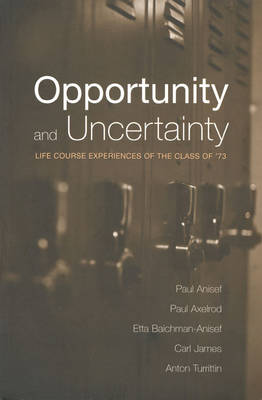
- Afhalen na 1 uur in een winkel met voorraad
- Gratis thuislevering in België vanaf € 30
- Ruim aanbod met 7 miljoen producten
- Afhalen na 1 uur in een winkel met voorraad
- Gratis thuislevering in België vanaf € 30
- Ruim aanbod met 7 miljoen producten
Opportunity and Uncertainty
Life Course Experiences of the Class of '73
Paul Anisef, Paul AxelrodOmschrijving
Based on the longest running panel study of its kind in Canada, this book examines events in the lives of a generation of Ontario residents who graduated from grade twelve in 1973. The study recreates the world of the early 1970s in which these high school students faced the future. It recounts their educational and occupational experiences in the late 1970s, follows their vocational and career pathways during the subsequent decade, and searches for patterns in their personal and family lives through the late 1980s and early 1990s. By painting a portrait of a little-known cohort, this interdisciplinary project provides a wealth of information about the links between schooling and employment in a time of economic instability and addresses the different ways in which women and men attempt to reconcile familial and occupational demands.
The study employs life course theory, which explores the dynamic relationship between the individual and the social order. Structural forces such as social class, gender, ethnicity, and race played an unmistakable role in the lives of the Class of '73. So, too, did human agency. Using survey research, historical documentation, in-depth interviews, and personal biographies, the authors seek to explain one generation's emergence from adolescence into adulthood in an era characterised by both opportunity and uncertainty.
Specificaties
Betrokkenen
- Auteur(s):
- Uitgeverij:
Inhoud
- Aantal bladzijden:
- 368
- Taal:
- Engels
Eigenschappen
- Productcode (EAN):
- 9780802083647
- Verschijningsdatum:
- 1/11/2000
- Uitvoering:
- Paperback
- Formaat:
- Trade paperback (VS)
- Afmetingen:
- 152 mm x 230 mm
- Gewicht:
- 512 g

Alleen bij Standaard Boekhandel
Beoordelingen
We publiceren alleen reviews die voldoen aan de voorwaarden voor reviews. Bekijk onze voorwaarden voor reviews.











